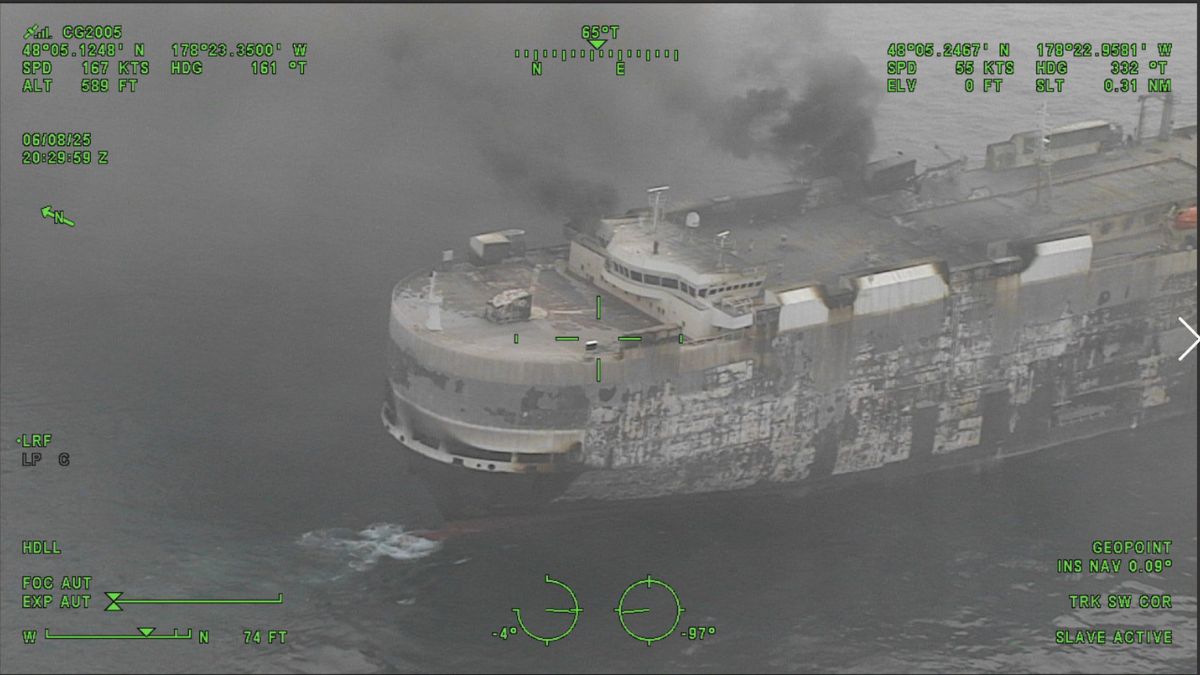New York: A massive cargo ship carrying 3,048 vehicles [70 – fully electric vehicles and 681 – hybrid vehicles] sank in the North Pacific Ocean on Sunday, weeks after a fire broke out on board. The Morning Midas, a South Korean-flagged car carrier, went under approximately 415 miles southwest of Adak, Alaska, according to the U.S. Coast Guard.
The vessel had been drifting unmanned since early June, when all 22 crew members were safely rescued following an onboard blaze. Officials say the fire started on June 3 on a deck loaded with electric vehicles, raising concerns about the safety of lithium-ion batteries at sea.
Also Read: This Heat Could Make You Seriously Sick—Read Before You Step Out
Blaze Broke Out on EV Deck
The Morning Midas departed from China on May 26 and was en route to Mexico when the fire was first reported. According to reports, flames broke out in the area where electric vehicles were stored — a growing concern in the maritime industry due to the fire risk associated with EV batteries.
Although no injuries were reported, the fire quickly rendered the ship uninhabitable. All 22 crew members were evacuated via lifeboat and rescued by a passing merchant vessel. The ship continued to drift for nearly three weeks before sinking on June 23 in waters estimated to be around 16,000 feet deep.
#UPDATE 5 USCG concluded response to a fire onboard the Morning Midas which sank ~450 mi SW of Adak Monday. No injuries or visible signs of pollution. 2 vessels on scene monitoring area with pollution response equipment with another en route.
Read more: https://t.co/Nee90erdyk https://t.co/SSSb1nwVii
— USCGAlaska (@USCGAlaska) June 25, 2025
Environmental Risk Being Monitored
The U.S. Coast Guard and the ship’s operator, Zodiac Maritime, are monitoring the area for signs of environmental damage. So far, there have been no visible oil leaks reported. However, officials and environmentalists are keeping a close watch due to the potentially toxic materials involved, including battery chemicals, fuels, and cargo-related waste.
Pollution-response vessels and oil-skimming ships were dispatched to the site ahead of the sinking, but rough seas complicated efforts to secure the vessel. Officials say ongoing assessments will determine whether salvage or further containment actions are required.
Shipping Industry Faces New Scrutiny
The incident has drawn comparisons to the 2022 Felicity Ace fire, another ship that caught fire while carrying electric vehicles and later sank. Both cases have intensified global concerns about how to safely transport EVs and other high-risk cargo by sea.
Maritime safety experts are now urging shipping companies and regulators to revisit protocols for storing and securing electric vehicles on board. Lithium-ion batteries are known to ignite under extreme heat or damage, and extinguishing such fires remains challenging, even with specialized equipment.
Investigation Underway
An investigation into the cause of the fire is ongoing. Zodiac Maritime, the ship’s London-based manager, has not yet released a full statement but confirmed that it is cooperating with international authorities. Insurance companies are also expected to evaluate the scale of financial losses, both in terms of cargo and ship damage.
The Morning Midas was built in 2008 and operated as a car carrier, capable of transporting thousands of vehicles across oceans. Its loss will likely lead to renewed discussions around risk mitigation, emergency response planning, and the future of electric vehicle shipping safety.







